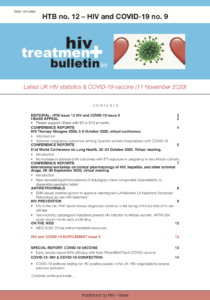HTB: no. 12 – HIV and COVID-19: issue 9 (11 November 2020)
11 November 2020. Related: Editorial.
- Contents online

- Download PDF – 1 column
- Subscribe to HTB by email
The most important news in this issue – for HIV or COVID-19 – is the early efficacy results from the Pfizer/BioNTech COVID vaccine. It gives us proof that not only can the scientific challenge of making a vaccine be overcome, but at a much higher efficacy level that was first hoped.
This produces optimism for other candidate vaccines (another nine are also in phase 3 studies) and for a future that will not be dominated by fear of future waves.
The main HIV news include the publication of latest UK HIV statistics which are still continuing to fall – although late diagnosis is still a serious challenge.
We also include news that cabotegravir/rilpivirine long acting injections have received a positive opinion for approval in the EU. This has been a long process and although there has always been really high interest in alternatives to oral ART. Implementation studies are already ongoing, although not so far in the UK.
Early results from the HPTN 084 study also show that cabotegravir LA is highly effective as PrEP for cisgender women – with similar results to HPTN 083 in gay men and transgender woman.
The issue is being distributed shortly after the UK enters the second lockdown we continue to include leading news about coronavirus and COVID-19.
As predicted in April, a second wave of corovavirus developed during October with dramatically higher rates of people testing positive, due to wider availability of testing.
Although the options for treatment are not greatly different for the second wave – with notable exceptions for dexamethazone and remdesivir – the experience from managing the first crisis means that outcomes will hopefully be better.
This is going to be critical because there have been several disappointments over the last weeks with some of the more promising treatments. In the last issue we reported disappointing results with tocilizumab (although other studies continue), and this issue includes lack of benefit from convalescent plasma in a randomised study in moderate COVID-19.
Development of the monoclonal antibody bamlanivimab by Eli Lilly has been stopped after a recommmendation from a DSMB showing no early signal of benefit – based on lack of positive response after five days.
The dual monoclonal antibody combination from Regeneron – REGN-COV2 (casirivimab/imdevimab) – has also stopped enrolling participants with severe COVID-19, after a DSMB recommendation due to a safety concern.
Finally, the large randomised international WHO SOLIDARITY study reported no survival benefit from hydroxychloroquine or lopinaivr/r – both or which were already known – but also from using interferon-Beta or, controversially, remdesivir. It had been hoped that the much larger numbers (more than other remdesivir studies combined), might have had sufficient power to show improved survival – when instead the SOLIDARITY results didn’t even showed faster recovery. These results have been blamed on the open label trial design and limited data collected across very different health settings.
Although the US FDA has just granted full approval to remdesivir based on reducing symptoms, the decision was only based on results from positive studies.
It will now be important to see the role of remdesivir in the upcoming WHO COVID-19 guidelines.

